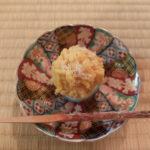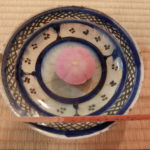一花開天下春
一花開天下春(いっかひらいててんかはるなり)は、春によく茶席で掛けられるものです。
春になると、梅や桃や桜が開花してとても華やかになります。
しかし、それまでには寒い冬を経て、春を漸く迎えたという事実があります。
従って、何かが成就するには、それまでの長い艱難辛苦が存在するのです。
出典は、『宏智禪師廣録』になります。
「上堂云。一塵起大地收。一花開天下春。衲僧變態。須是恁麼始得。便乃一切時一切處。任運自在。應用無方。諸人還委悉麼。風行草偃。水到渠成。」
(上堂シテ云ク、一塵起キテ大地収マリ、一花開イテ天下春ナリ。衲僧変態。須ク是レ恁麼(いんも)始メテ得ルベシ。便乃(すなわ)チ一切ノ時、一切ノ処、運ニ任セ自在、応用無方。諸人還(マタ)委悉(いしつ)スヤ。風行ケバ草偃(そうえん)ス。水到リテ渠(みぞ)成ル。)
衲僧とは衲衣を着た禅僧ですが、それが姿を変えるには何かしらの所行があります。
これはどのようになされるのか、ということが問題です。
すなわち、全ての時、全ての場所は、運のままであって、まさに自由自在です。
詳細に細かく考えてみると、風が吹けば草がなびき、水が流れれば溝ができる、ということです。
従って、因果応報には違いませんが、捉え所のないものを具現化するには、やはり、それなりの対応が求められ、不真面目であってはならないということです。
サクラサクとは、昔の電報で入試の合格を伝えた言葉です。
この春から新しい生活を始める方も多いと思われますが、次ぎの花を開かせるべく精進したいものです。
「冬来たりなば春遠からじ」
“Ode to the West Wind”, Percy Bysshe Shelley
I
O wild West Wind, thou breath of Autumn’s being,
Thou, from whose unseen presence the leaves dead
Are driven, like ghosts from an enchanter fleeing,
Yellow, and black, and pale, and hectic red,
Pestilence-stricken multitudes: O thou,
Who chariotest to their dark wintry bed
The winged seeds, where they lie cold and low,
Each like a corpse within its grave, until
Thine azure sister of the Spring shall blow
Her clarion o’er the dreaming earth, and fill
(Driving sweet buds like flocks to feed in air)
With living hues and odors plain and hill:
Wild Spirit, which art moving everywhere;
Destroyer and preserver; hear, oh, hear!
II
Thou on whose stream, ‘mid the steep sky’s commotion,
Loose clouds like earth’s decaying leaves are shed,
Shook from the tangled boughs of Heaven and Ocean,
Angels of rain and lightning: there are spread
On the blue surface of thine aery surge,
Like the bright hair uplifted from the head
Of some fierce Maenad, even from the dim verge
Of the horizon to the zenith’s height,
The locks of the approaching storm. Thou dirge
Of the dying year, to which this closing night
Will be the dome of a vast sepulchre,
Vaulted with all thy congregated might
Of vapors, from whose solid atmosphere
Black rain, and fire, and hail will burst: oh, hear!
III
Thou who didst waken from his summer dreams
The blue Mediterranean, where he lay,
Lulled by the coil of his crystalline streams,
Beside a pumice isle in Baiae’s bay,
And saw in sleep old palaces and towers
Quivering within the wave’s intenser day,
All overgrown with azure moss and flowers
So sweet, the sense faints picturing them! Thou
For whose path the Atlantic’s level powers
Cleave themselves into chasms, while far below
The sea-blooms and the oozy woods which wear
The sapless foliage of the ocean, know
Thy voice, and suddenly grow gray with fear,
And tremble and despoil themselves: oh, hear!
IV
If I were a dead leaf thou mightest bear;
If I were a swift cloud to fly with thee;
A wave to pant beneath thy power, and share
The impulse of thy strength, only less free
Than thou, O uncontrollable! If even
I were as in my boyhood, and could be
The comrade of thy wanderings over Heaven,
As then, when to outstrip thy skiey speed
Scarce seemed a vision; I would ne’er have striven
As thus with thee in prayer in my sore need.
Oh, lift me as a wave, a leaf, a cloud!
I fall upon the thorns of life! I bleed!
A heavy weight of hours has chained and bowed
One too like thee: tameless, and swift, and proud.
V
Make me thy lyre, even as the forest is:
What if my leaves are falling like its own!
The tumult of thy mighty harmonies
Will take from both a deep, autumnal tone,
Sweet though in sadness. Be thou, Spirit fierce,
My spirit! Be thou me, impetuous one!
Drive my dead thoughts over the universe
Like withered leaves to quicken a new birth!
And, by the incantation of this verse,
Scatter, as from an unextinguished hearth
Ashes and sparks, my words among mankind!
Be through my lips to unawakened earth
The trumpet of a prophecy! O Wind,
If Winter comes, can Spring be far behind? (冬来たりなば春遠からじ)





